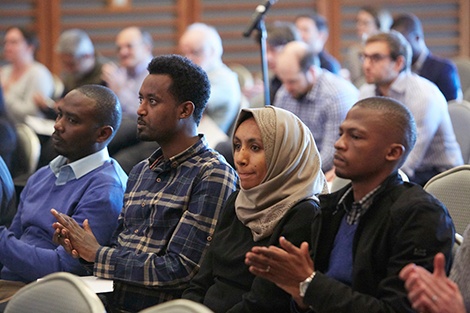Technological innovations, such as lowering the costs of diagnostics and treatments and allowing researchers to analyze more and better data, have the potential to lead to major improvements in human health.
However, challenges persist in ensuring that technologies are affordable, made widely available, and are designed to meet the needs of populations.
These were among the issues discussed at Harvard T.H. Chan School of Public Health’s sixth annual State of Global Health Symposium, held March 28, 2019 at the Joseph B. Martin Conference Center as part of the School’s Global Health Week. The event highlighted some recent technologies in global health, and what it will take to turn them into scalable solutions.
In opening remarks, Ashish Jha, dean for global strategy and K.T. Li Professor of Global Health, and the director of Harvard Global Health Institute, called himself a “techno optimist,” but also offered a warning. He said that artificial intelligence, for example, offers “incredible potential to change care, but it is only as good as the data.” It could be vulnerable to human biases, he said, which will require oversight. “If we get this wrong, the consequences will be enormous, but I think we will get it right and it will make a big difference in global health,” he said.
In a keynote, Adolfo Rubinstein, SM ’96, Argentina’s national secretary of health, spoke about how inequity can be an unintended consequence of technological innovation—a concern shared by other speakers at the event. Rubinstein said that he is working to make sure that the most vulnerable people in his country are able to access health innovations.
Other speakers shared examples of potentially transformative technologies in global health, including the Harvard Humanitarian Initiative’s KoBoToolbox, a suite of tools for collecting data in challenging environments, and a low-cost CPAP machine—a treatment for obstructive sleep apnea—that doesn’t require electricity.
Richard Cash, senior lecturer on global health, reminded the audience that effective innovations can be simple. He helped develop and launch oral rehydration solution (ORS) in the 1960s—a mixture of water, sugar, and salt that is administered as part of oral rehydration therapy—which is credited with preventing tens of millions of deaths from cholera and other diarrheal diseases.
Offering his advice on how to scale up a new innovation, he said, “Monitor, evaluate, adapt, and advocate.” The most important way to do this, he said, is to “Get out to where the people are.” For example, while boiled water was best used in ORS, it wasn’t always easy or possible. By consulting with the people they were trying to help, he and his colleagues arrived at a more workable solution—using the “best water possible.”
The event also included student presentations of projects developed during a recent Innovation and Global Health Systems class at Harvard Chan School, including a health care app for Syrian refugee women in Turkey, and a program to develop hurricane-resistant vegetable gardens on the island of Barbuda.
A student poster session followed the event. First prize was awarded to Dorit Stein, SM ’19, for a study of knowledge about diabetes among health care providers in Indonesia.















